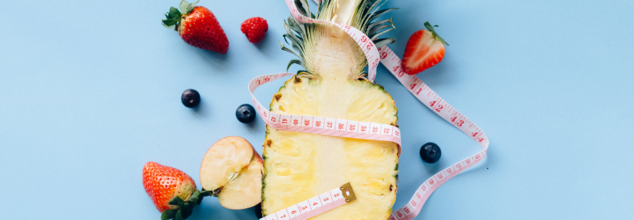- Health Conditions A-Z
- Health & Wellness
- Nutrition
- Fitness
- Health News
- Ayurveda
- Videos
- Medicine A-Z
- Parenting
- Web Stories

Image Credit: Canva
Healthy Food Swaps You Can Make For Sugary Choices Throughout Your Day
Everywhere you go, it's sugar-free this and sugar-free that. Sugar itself isn't the bad guy here; understanding the difference between natural and added sugars and making the right substitutions can set you up for success in this pursuit of a healthier lifestyle. In this feature, we talk about what sugar means to our diet and present how to convert some sugar-relished indulgence into energy- and nutrition-boosting alternatives.
Sugar is one of the types of carbohydrates. Carbohydrates are a macro-nutrient, but not like fiber or starch, are not strictly essential for a healthy diet. The natural sugars, like sucrose- common table sugar, fructose, and glucose, are present in fruits, vegetables, and dairy products. However, these sources of natural sugar also contain the important nutrients: fiber, antioxidants, and vitamins.
In contrast, added sugars-laden processed food and beverage contain virtually no nutrition and can cause problems ranging from obesity to type 2 diabetes, heart disease. Your body absorbs glucose, that is a molecule of glucose, to energize your body systems. Yet at the same time, added sugars in the diets can severely overwhelm the finely poised balance within an organism.
Why Healthy Food Swaps Make a Difference
Making small, consistent changes to your diet daily can significantly improve your long-term health. Healthy food swaps include substituting lower nutritional choices with healthier, more nutrient-dense alternatives. Such as substituting sugary sodas for sparkling water infused with a splash of fruit juice; not only is this cutting sugar, but it also contributes to hydration and a natural flavor.
Regardless of the reason-to lose weight, stabilize energy, or simply achieve healthier living-sugar swaps is one way to an easily achievable, long-term change.
Healthy Food Swaps to Reduce Sugar
Now take a more in-depth look at how easily you can begin making changes to your daily food habits:
1. Change Up Your Drinks
Craving the fizz of sugary sodas? Replace them with sparkling water that has a splash of fresh fruit juice or herbal teas. These options fulfill your desire for flavor without spiking your sugar intake.
2. Sweeten Desserts Naturally
Instead of piling sugary toppings onto desserts, try garnishing with chopped nuts, fresh fruits, or a dusting of cocoa powder. These additions enhance flavor and nutrition simultaneously.
3. Reinvent Your Morning Coffee or Tea
If you normally sweeten your hot beverages, think about adding a sprinkle of cinnamon, a splash of unsweetened almond milk, or even a dash of vanilla extract. These additions bring a flavor boost without added sugar.
4. Eat Smarter
Instead of grabbing for candy or cookies, choose naturally sweet snacks such as unsweetened dried fruits, dark chocolate with at least 70% cocoa, or fresh berries with Greek yogurt.
5. Refresh Your Dessert Habits
Instead of indulging in heavy desserts, complement your meal with a fruit platter. For added sweetness and digestive benefits, consider jaggery, a traditional sweetener packed with minerals like iron and potassium.
6. Healthify Your Baking
Replace white sugar with mashed bananas, unsweetened applesauce, or honey in your bakes. Such alternatives not only give moisture and nutrient-dense quality but also significantly reduce the glycemic load.
7. Get Savvy With Sauces and Dressings
Most of your commercial dressings, like ketchup and barbecue sauce, contain quite a lot of sugar. Do make homemade dressing with olive oil, balsamic vinegar, mustard, or avocado.
Should You Eliminate Sugar Completely?
It is quite appealing to cut sugar entirely out of one's diet. However, the negative impact might not be desirable. Natural sugars found in fruits, whole grains, and dairy products are great sources of energy and nutrients. If removed entirely, this may lead to deficiencies and symptoms like fatigue or brain fog.
Instead, they suggest cutting back on added sugars and artificial sweeteners. Ideally, one should strive for an approach that brings together whole, nutrient-dense foods and limited processed ones.
Easy Ways to Make Healthy Choices Every Day
Integrating these changes into your daily routine doesn’t have to be daunting. Start by identifying your high-sugar habits—such as sodas, dessert cravings, or processed snacks—and replace one item at a time with a healthier option.
- Prep your own meals and snacks to control ingredients.
- Stock your pantry with natural sweeteners and whole foods.
- Experiment with herbs and spices to enhance flavor naturally.
- Keep a stash of fresh fruits and unsweetened yogurt for quick treats.
Over time, these small shifts will become second nature, transforming your diet and supporting your health goals.
Adopting healthy food swaps doesn’t require drastic changes. Start with one or two small changes, like replacing soda with sparkling water or using fruits to sweeten desserts instead of sugar. Plan your meals and snacks in advance, focusing on whole, unprocessed foods. Keep healthy alternatives, such as nuts and dried fruits, on hand to curb cravings.
Gradually adjust your taste buds to appreciate natural sweetness. Celebrate your progress and remember, it's about balance, not perfection. These easy, consistent steps will help you cut down on added sugar easily while nurturing a healthier lifestyle.

The Dangers Of Taking Too Many Supplements For Your Liver
Thinking about taking supplements to boost your well-being quest? You're not the only one. As worldwide sales of supplements are expected to exceed $230 billion by 2027, they've become the face of preventive health. But experts are now sounding the alarm about a less obvious risk—the silent effect they have on your liver.
From daily vitamin pills to herbal powders that claim to deliver everything from healthy skin to improved concentration, supplements are frequently perceived as benign. But the reality is, when taken excessively or without instruction, they may be doing more damage than good—particularly to one of your body's most critical organs: your liver.
Your liver is your body's biochemical sorting center. It sifts through everything from food to poisons to medicines—and, yes, supplements.
As per Dr. Karan Rajan, a well-known UK surgeon and educator with more than 1.7 million followers on Instagram, even natural supplements undergo liver metabolism. "That means your liver breaks them down with enzymes, which impacts how hard it has to work," he says. When your liver is overwhelmed, your liver cannot detoxify the body effectively, and there is a higher risk of inflammation, scarring, or worse—acute liver injury.
In a recent case cited by Dr. Rajan, a female patient developed organ failure following consumption of supplements aimed at hair and nail growth. "Just don't turn your liver into a science fair project gone wrong," he cautioned in a now-famous video.
What Constitutes a Supplement?
According to the U.S. Food and Drug Administration (FDA), dietary supplements comprise:
Vitamins: A, C, D, B-complex
Minerals: Magnesium, calcium
Herbal compounds: Elderberry, ginger
Botanical powders: Green powders, turmeric blends
Probiotics: Live bacteria or yeasts that aid digestive system health
Supplements have been a daily fill for many people. Be it vitamin C as an immunity boost during the flu season or B12 for that energy drive, individuals look toward pills in anticipation of a good meal. Without proper checks and balances, the practice tends to go downhill fast into becoming a health risk.
The risk isn't necessarily in the supplement itself—but in the amount you take and how it affects other substances in your body.
"More isn't always better," warns Dr. Rajan. "Excessive doses of even simple vitamins like vitamin A can cause liver damage or brain pressure."
Other risks that are known include:
Vitamin D overdose: Can increase blood levels of calcium, leading to kidney issues and changed mental status.
Unregulated herbal mixes: May create unknown chemical interactions, especially if you’re taking multiple at once.
Drug interactions: Supplements like St. John’s Wort can interfere with antidepressants or blood thinners.
With so many supplements flooding the market, choosing a safe one can feel like a gamble. Flashy packaging and bold health claims are not enough.
Dr. Rajan suggests checking for third-party certifications. Labels such as (e.g., USP, NSF, or ConsumerLab) mean that the product has been independently tested to be of good quality, purity, and accuracy of ingredient descriptions. Although no certification can absolutely ensure 100% safety, it significantly lessens your risk of taking something potentially toxic to the liver.
How to Take Supplements the Right Way?
So does it mean you must abandon supplements altogether? No. Properly planned, supplements can be useful. Here's how to do it safely and responsibly:
1. Talk to a Healthcare Professional First
Don't start adding anything to your routine without first talking to a physician or registered dietitian. They can check whether you actually need it, particularly if taking prescription meds such as statins, antidepressants, or anti-epileptics.
2. Get Your Blood Work Done
Beginning a new supplement? Have your doctor perform liver function tests (LFTs). This establishes a baseline and allows you to track how your liver reacts over time.
3. Consult Expert
This FDA and NIH-supported database contains in-depth case reports on how drugs and supplements impact the liver. Supplements graded Grade A, B, or C need to be treated with additional caution.
4. Don't Mix Multiple Supplements
Taking more than one herbal supplement or taking high doses of several vitamins at once can have synergistic toxicity. Unless prescribed by a professional, keep it simple and concentrated.
Supplements aren't bad in themselves—but taking them without knowing how they'll affect your liver might be very bad indeed, sometimes causing irreversible damage. As consumer interest increases, so should awareness and prudence.

(Credit-Canva)
Neurologist Lists 5 Common Foods That Are Quietly Damaging Your Brain Function
We've all rolled our eyes at our parents' dinner table lectures, “Eat your veggies, they'll make you smarter!” But what if they were right all along? Think about it, can a bowl of leafy greens really protect your memory? Could that sugary snack or burnt barbecue actually speed up brain aging? From the power of omega-3-rich fish to the silent damage from ultra-processed foods, we're breaking down the science behind food and cognitive health.
When it comes to brain function, Harvard Health Publishing explains that following a strategic and healthy diet is key to a healthy brain. A diet filled with whole grains, fruits, vegetables, legumes and healthy fats rather than foods that are filled with saturated fats and added sugars.
Can Food Slow Down Your Brain Aging?
Leafy greens like kale spinach collards and broccoli are rich in nutrients like vitamin K that is necessary for brain health and slow down cognitive decline. Fatty fish also has omega-3 fatty acids that have been shown to lower the levels of beta-amyloid in our blood, which is a protein that clumps in our brain and cause Alzheimer's disease.
However, what are some foods you should avoid for your brain health?
Dr. Ramon Velazquez, a neuroscientist and advisor at Mind Lab Pro, has highlighted five common food categories that could be silently damaging to our brain over time. He explained that the dietary choices we make in our youth can significantly influence our cognitive function as we age.
Super-Processed Foods
Those quick and easy meals and snacks often have lots of extra stuff that isn't good for you. Dr. Velazquez warns that eating a lot of these foods might make your brain age faster. He says they can cause swelling that hurts the connections between your brain cells. He suggests eating whole foods like fruits, veggies, and plain meats instead.
Fish
Fish can be good for your brain, but some big fish that live a long time can have too much mercury in them. Mercury is a poison that can hurt your brain. Dr. Velazquez says it can get into your brain and mess with how it works, which can cause problems with thinking later on. It's better to avoid fish like shark and swordfish.
Burnt Food
That tasty char on grilled food makes bad components called AGEs. Dr. Velazquez says these AGEs can cause swelling in your brain and might even be linked to the stuff found in people with Alzheimer's. He suggests cooking food in ways that don't burn it, like steaming or boiling.
While Dr. Velazquez warns about burnt food, another expert says it's okay sometimes if you mostly eat a balanced diet with lots of good stuff. They say enjoying a little burnt food now and then is fine if the rest of your diet is healthy.
Fake Sweeteners
Dr. Velazquez says that some fake sweeteners might change the good bugs in your stomach in a way that causes swelling. This swelling could then hurt your brain and maybe even increase the chance of brain problems later. He suggests trying natural sweeteners like honey or maple syrup instead and trying to eat less sweet stuff overall.
Too Much Alcohol
While some people like to drink to relax, too much alcohol can really hurt your brain. Dr. Velazquez says that drinking a lot for a long time can actually make your brain shrink. It especially hurts the part of your brain that helps you make decisions and think clearly. So, it's best to drink only a little, if at all.

Credits: Canva
What Counts: Calories Or Carbs?
Intermittent fasting is known for its role in weight loss, however, research has shown that its benefits could go beyond the scale. Even if your goal is not weight loss, you could still benefit from intermittent fasting, as it helps improving your gut and metabolic health. However, many people find it difficult to follow, especially the 5:2 version of the diet, which involves severely limiting calories for two days a week.
New findings suggest a simpler alternative: you may not need to drastically cut calories at all. Reducing carbohydrate intake twice a week could be just as effective in improving metabolic health.
How Fasting Impacts Metabolism
Fasting changes the way our bodies use energy. After eating, the body enters the “postprandial” state, where it burns carbohydrates for energy and stores any excess. Several hours later, when in the “fasted” state, the body begins to burn fat instead. Alternating between these states helps the body become more flexible in how it uses fuel — a process known as improved metabolic flexibility.
This flexibility is closely linked to better heart and metabolic health, including a reduced risk of insulin resistance, type 2 diabetes, and cardiovascular disease.
Fasting vs. Calorie Restriction
In a previous study, researchers tested how the body reacts after a day of fasting or severe calorie restriction. The next day, participants consumed a high-fat breakfast. Those who had fasted or eaten very few calories the day before burned fat more efficiently. Their bodies had shifted from relying on carbs to using fat as a primary energy source — a change that lasted beyond the fasting period.
In another comparison, one group followed an intermittent fasting plan while another followed a calorie-restricted diet until both lost 5% of their body weight. Despite the same amount of weight loss, the fasting group showed better improvements in how their body processed food.
The Role of Carbohydrate Restriction
Researchers then looked into whether it was the calorie cut or the drop in carbohydrates that made the difference. In a recent study, 12 overweight and obese participants followed two separate diet days: one with severe calorie restriction, and another with a very low-carb intake. After each, they ate a high-fat, high-sugar meal.
The result? Both approaches led to similar improvements in fat burning. This suggests that limiting carbs may be just as effective as fasting when it comes to supporting metabolic health.
These findings may offer a more flexible approach to metabolic health. Severe calorie restriction can be difficult to sustain and may even lead to nutrient deficiencies or disordered eating. Likewise, long-term carb restriction can be hard to follow and might create an unhealthy relationship with food.
Researchers are now exploring a low-carb version of the 5:2 diet, where carbohydrate intake is reduced just two days a week. If successful, this method could provide the health benefits of intermittent fasting without the need for extreme calorie cuts.
© 2024 Bennett, Coleman & Company Limited

